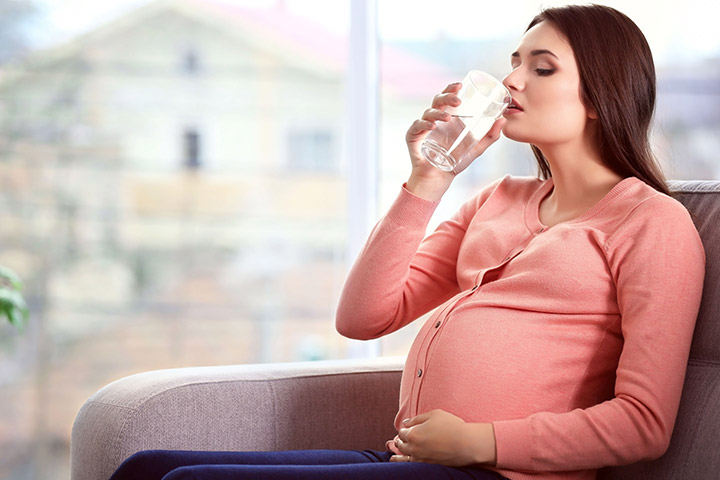Persistent thirstiness, light-headedness, dry skin and dry lips. Are you suffering from all these during pregnancy? No doubt, you are losing a lot of body fluids. Do not take dehydration lightly during pregnancy as it could sometimes be life-threatening to both the mother and the baby.
MomJunction helps you understand what happens if you are dehydrated during pregnancy, how long it takes to recover and what steps you need to take to treat the condition.
How Much Water Should You Drink When Pregnant?
You need to drink eight to ten glasses of water every day (1). The quantity can include the beverages you consume but, ideally, your first option should be plain water. Fluids such as juice, milk, tea and coffee contain water and contribute to your fluid intake, but they also give you extra calories.
Your body needs extra water for performing additional functions during pregnancy, and not taking sufficient water can cause adverse effects on the fetus. Water helps in the formation of the placenta, through which the growing fetus takes nutrients. In the later stage of pregnancy, water helps in forming the amniotic sac. Therefore, it is important to avoid dehydration during pregnancy.
What Causes Dehydration During Pregnancy?
Your body uses high amounts of water due to certain conditions during pregnancy. It could result in dehydration if you are not trying to replace the lost fluids.
The symptoms of morning sickness result in the loss of fluids and electrolytes from your body, causing dehydration. Moreover, nausea will not allow you to take fluids, making it harder for the body to regain the lost water (2).
Hyperemesis symptoms also cause a severe loss of water and electrolytes. It leads to fever, associated with nausea and vomiting, causing excessive sweating and dehydration.
Some other factors that increase the risk of dehydration are:
Signs And Symptoms Of Dehydration In Pregnancy:
Once your body is depleted of water, it shows the dehydrated symptoms and signs. It is vital for you to recognize them.
1. Maternal overheating is a sign where your body has trouble in regulating the heat.
2. Thirst is the initial and the most unnoticed sign. Do not neglect if you are thirsty, listen to your body and drink water. Maintain a routine of drinking water often, at least one glass an hour.
3. Dizziness, vertigo or lightheadedness, usually when standing, kneeling or bending over. It happens due to the drop in blood pressure because of dehydration.
4. Headache, especially migraines, is another prominent symptom of dehydration.
5. Dark yellow urine with a strong odor. Clear urine means you are hydrating yourself properly.
6. Braxton-Hicks contractions (painless uterine contractions)
7. Dry mouth, nose, and skin which has lost its elasticity.
8. Swollen tongue and chapped lips.
9. Vomiting and nausea associated with abdominal pain and cramps.
Severe Dehydration Symptoms Could Be:
10. Weakness
11. Lack of concentration
12. Constipation
13. Piles
14. Urinary tract infections
Dehydration is a common problem that all of us experience. But can it lead to some serious complications during pregnancy?
What Are The Effects Of Dehydration During Pregnancy?
During the first trimester of pregnancy, dehydration might result in two risks:
During the second and third trimesters of pregnancy, dehydration can pose the risk of premature births. It is one of the reasons for premature contractions.
How Dehydration Leads To Premature Birth:
During dehydration, the blood volume decreases, thereby increasing the levels of oxytocin (the hormone responsible for contractions) leading to premature labor.
It also raises the body temperature, causing further complications such as heat exhaustion or heat stroke leading to fever, muscle cramps, urinary tract infections and other heat related issues. If you are continuously dehydrating, the nutritional values of breast milk change.
Dehydration during pregnancy is very common, and you can avoid it. There is no better solution than taking plenty of water. If this issue is due to nausea, talk to the doctor and get medical assistance.
Treatment Of Mild Dehydration During Pregnancy:
If you are experiencing moderate or mild dehydration symptoms, you can regain the lost fluids by consuming more water.
Water, herbal tea, and decaffeinated coffee are good options.
Fruit juices, soft drinks, milk, soups are acceptable but to a lesser extent than those above.
Say no to alcoholic beverages.
When To Call A Doctor?
If dehydration is mild, it can be treated at home. But, if the above remedies do not work and you start experiencing severe symptoms, you should see your healthcare provider without any delay.
The unusual symptoms can be:
Your healthcare provider may advise you to get hospitalized so that a comprehensive line of tests are conducted to understand the underlying cause. She may mostly prescribe intravenous therapy, which immediately replenishes your body with essential water and nutrients.
Preventing Dehydration During Pregnancy:
Fatigue caused due to dehydration brings down the energy levels, making you feel dull and lethargic; to avoid this, make sure you drink enough water every day.
If you are finding it tough to keep yourself hydrated, talk to your doctor and get the right advice.
Follow the preventive measures and dehydration remedies, instead of waiting for the doctor to treat you. If your dehydration is because of any above-mentioned risk factors, consult your healthcare provider or gynecologist. Also, confirm with them whether the energy drinks you consume are safe or not.
Thank you readers for your interest in our article. If you have any comments, don't hesitate to comment below the article so we can improve it

0 Comment:
Post a Comment